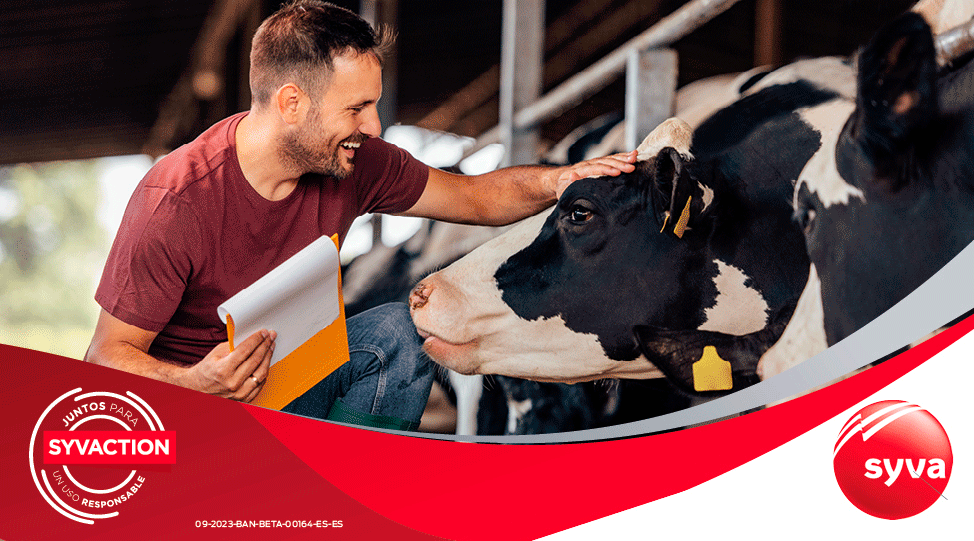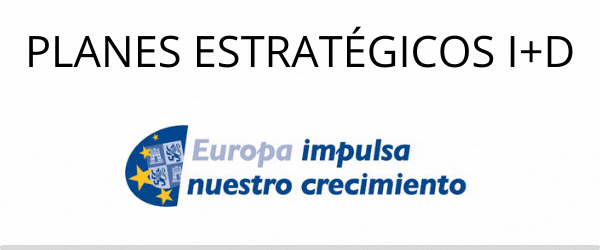The first international jury in the history of the Syva Prize has chosen the 3 winning theses of the 27th edition.
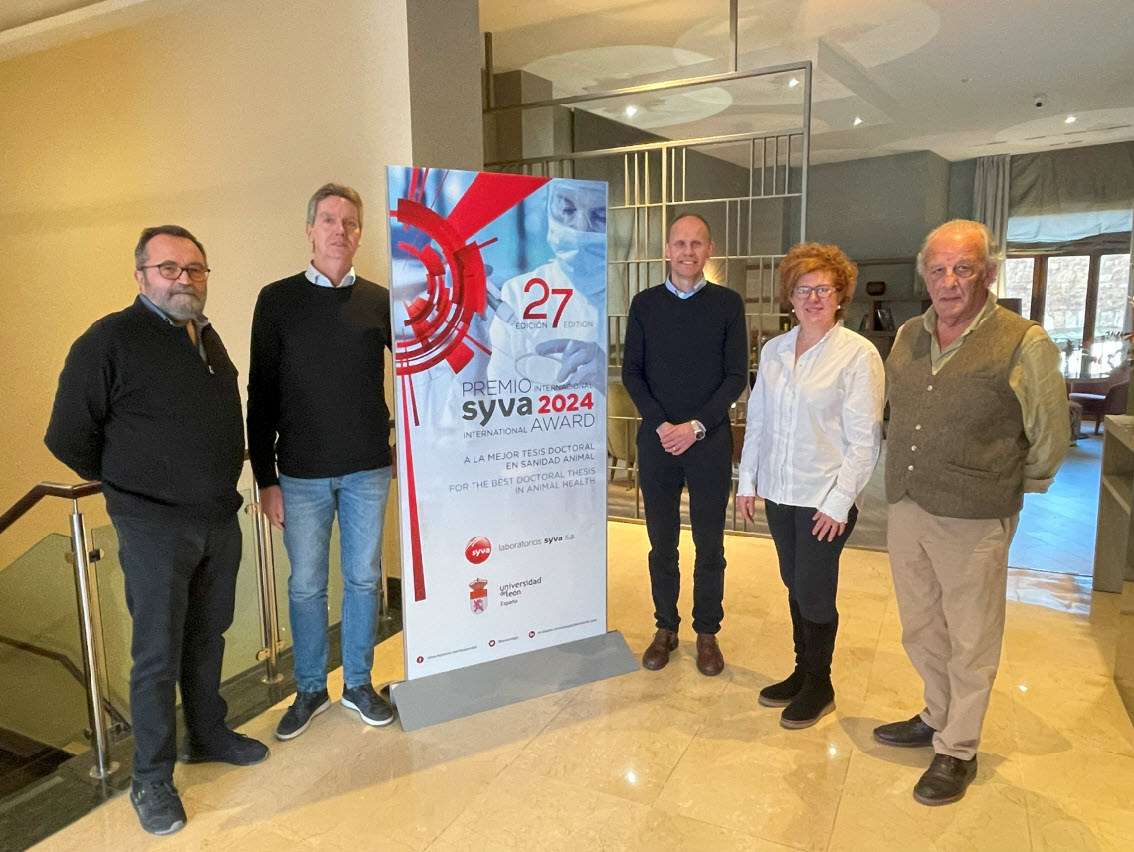
In Spain, the Syva Award has become a ‘kind of legend’ over the years, something you hear about throughout your studies when you embark on a veterinary career, but especially when you decide to go further and get a PhD in animal health.
Obtaining a PhD is a major achievement in the life of a young researcher. Winning the “prestigious” Syva Award is an additional encouragement, adding another dimension to this long and difficult journey in conducting research.
For 27 years, the Syva Award has rewarded the work of young PhD students submitting their theses in the field of animal health, regularly increasing the prize money and underlining its commitment to research, science and the spreading of knowledge in this field.
Before unveiling the names of the winners, we feel it is important to remind you of a few highlights.
The special feature of this 27th edition!
Last year, Syva decided to reward the work of three PhD graduates instead of just one, and has now included this possibility in its basis for the future.
The most remarkable fact about this year, and the fundamentals for the future, is that the Syva Award has taken on an additional international dimension by opening up applications to almost 70 countries in which the company operates.
Of course, there is still work to be done in terms of communication to ensure that the academic world and young doctoral students from all these countries are aware of the existence of the Syva Award, as one of our panel members, Dr Piet van Rijn from the Dutch research institute and reference laboratory, Wageningen Bioveterinary Research, rightly commented.
But it is the first time, and the reputation of this Award in Spain was not built in one year either.
23 theses were submitted.
The result is quite encouraging, as 23 theses were submitted in this first year of the opening to international applications. Only two did not meet the criteria, but almost half (10) came from countries outside Spain, such as Belgium, Sweden, Russia, Bulgaria, Austria, France, Bangladesh and Portugal.
An international panel of experts for an international award
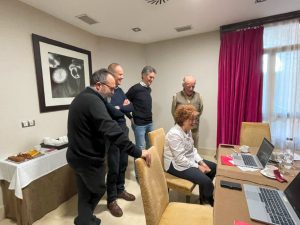
The international extension of the Syva Award must therefore be accompanied by an international panel of experts, and this has been achieved by inviting new members from universities and institutions outside Spain to the discussion table.
Thus, next to the president, Pedro Rubio Nistal, professor at the University of León, the secretary, Luisa de Ariba, from the R&D and Vaccine Registration Department at Syva, and Marcelo de la Heras Guillamón, from the University of Zaragoza, two new faces, Piet van Rijn from Wageningen Bioveterinary Research in the Netherlands and Dominiek Maes from the Ghent University in Belgium, provided their experience and opinions to this tribunal, to elect the 3 best doctoral theses in animal health for 2024.
And the winners are…
We will come back to this board and its members later, because we believe that it is worthwhile to highlight the work done, to review how it works and how the 5 members of this board managed to agree almost perfectly on the 3 theses that attracted all the attention and ticked all the boxes in their eyes. But let’s not prolong the suspense any longer and reveal the names of the winners.
The winner of the main prize 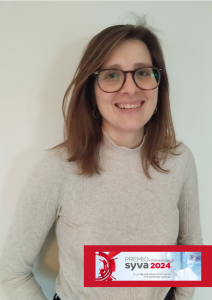 Dr. Ana García-Galán Pérez from the University of Murcia with her work:
Dr. Ana García-Galán Pérez from the University of Murcia with her work:
Mycoplasma bovis infection in Spanish cattle herds and evaluation of new control strategies / Infección por Mycoplasma bovis en rebaños bovinos españoles y evaluación de nuevas estrategias de control
Ana won the 18,000 euro grant for the main award. Congratulations!
It’s always a very intense moment when we have to announce the good news to the winners. We never know their location and availability, as they are often at work and the fluidity of the connection depends on it.
When the doctor he secretary of the panel, contacted Ana via Teams to give her the great news, we were able to see the We could see the surprise on his face, then a hint of disbelief followed by a big smile signifying that the news had reached that part of the brain that activates all the indicators of joy.
As the tribunal members congratulated her and asked her how she felt after receiving the news, she told us that she had hesitated for a long time before applying…. “Since this year the prize was open to “more than 25 countries”, in the end I said to myself, I’m going to try anyway, we’ll see, and the truth is that I didn’t think that in these conditions it would still be possible”.
One thing is quite obvious, and that is that submitting an application is the first step to be included in the list of candidates for any competition or award, and we can only encourage all PhD researchers who have obtained their doctorate in the field of animal health and who meet the criteria set out in our regulations to take this step.
Two second prizes were awarded to
As we have already informed you, the awarding of two second awards, which in the previous edition had highlighted the quality of two more theses, has been confirmed in the rules. Of course, this award is linked to the quality of the work submitted regardless of the winning thesis., and the selection board may well decide not to grant them, or to grant only one, if it considers that the basic requirements have not been fulfilled and that the quality of the theses, such as the scientific approachthe development of the arguments and their clarity from an editorial point of view, or the quality of the scientific production, is unsufficient. Let us not forget that the quality of the scientific output should also be reflected in the fact that it is published in one of the journals cited in the JCR[Journal of Citation Report] and counts for 25% in the evaluation of the work.
These elements of quality tipped the balance in favour of the two theses that received these second prizes.. Accordingly, the following were granted
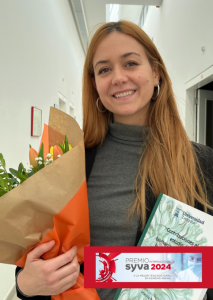 Dr. Marina Betancor Caro, of the University of Zaragoza for her work:
Dr. Marina Betancor Caro, of the University of Zaragoza for her work:
Contributions to the study of biomarkers, therapy and strain phenomena in prion diseases.
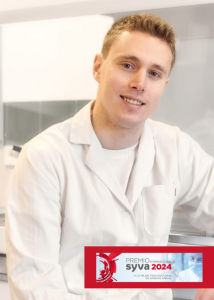 Dr. Héctor Puente Fernández, of the University of León for his work:
Dr. Héctor Puente Fernández, of the University of León for his work:
Diarreas de etiología vírica en el ganado porcino: aportaciones al diagnóstico y control / Viral diarrhoea in swine: contributions to diagnosis and control
The same emotions were reflected on their faces when Dr. Luisa de Arriba made the announcement through Teams and, above all, the joy of having been selected by our international panel of international experts.
The Syva Award is also a recognition for universities and research groups.
Let us not forget to highlight the research groups and the work of the thesis supervisors who supervise, pass on their knowledge and do an incredible job of mentoring their doctoral students during this journey that takes several years of life and sacrifice.
Among them, the the International Doctoral School and the research group in ruminant animal health of the Faculty of Veterinary Medicine of the University of Murcia., which provided support to PhD candidate Ana García-Galán Pérez, the Centre for Encephalopathies and Emerging Communicable Diseases Department of Animal Pathology Faculty of Veterinary Medicine of the University of Zaragoza, who provided support to Dr. Marina Betancor Caro, and the Department of Animal Health of the Faculty of Veterinary Medicine of the University of León.who provided support to Dr. Héctor Puente Fernández. Thank you and congratulations to them for carrying out this mission and for nurturing vocations within the scientific community.
As part of the traditions surrounding the Syva Award, we will soon be welcoming the 3 winners of this 27th edition to León for an awards ceremony, during which we will have the pleasure of listening to them speak about their work and give us their testimonials.Stay tuned!
——-
Who are the members of the panel of this 27th edition of the Syva Award, which is now international?
Let’s start with our two members from outside Spain. One is Belgian and the other Dutch, and both have brilliant careers in their home countries.
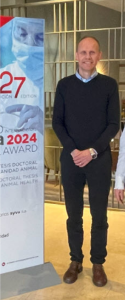 Dr Dominiek Maesis currentlyfull professor in pig health management at the Faculty of Veterinary Medicine of Ghent University. After graduating as a veterinarian at the same University, he specialised in animal production, epidemiology and herd health at the Universities of Ghent and Utrecht. Shortly after, he worked at the University of Minnesota in the United States as a postdoctoral researcher. He is also a graduate of the European College of Veterinary Public Health and the European College of Pig Health Management. He has conducted research in various areas of pig health management, with a special focus on respiratory diseases, and his teaching work at the University of Ghent is related to pig health management.
Dr Dominiek Maesis currentlyfull professor in pig health management at the Faculty of Veterinary Medicine of Ghent University. After graduating as a veterinarian at the same University, he specialised in animal production, epidemiology and herd health at the Universities of Ghent and Utrecht. Shortly after, he worked at the University of Minnesota in the United States as a postdoctoral researcher. He is also a graduate of the European College of Veterinary Public Health and the European College of Pig Health Management. He has conducted research in various areas of pig health management, with a special focus on respiratory diseases, and his teaching work at the University of Ghent is related to pig health management.
He is strongly aware of the sacrifices for candidates to obtain a PhD, as he is the author of more than 300 publications in international scientific journals and has sponsored some 31 PhD theses.
He expressed his pleasure at being invited to be part of this panel. He believes that the internationalisation of the Syva Award will have a great impact on the quality of the theses, and is convinced that it will also increase the number of theses submitted and that, in general, this will contribute to raising the quality of the theses competing for the award. He comments on his first experience of the Syva Award…“It has been an interesting experience. I have participated in similar juries in the past and it is always interesting to listen to colleagues… how they read a thesis, or how they analyse the strengths and weaknesses of the different theses. From this point of view, I think we achieved a fair balance between the different aspects. The quality, the quantity of work, the different methodologies used, the workload, the complexity of the protocols and methods used. And I think that in the end we have reached a conclusion in which all these aspects have been taken into account.“.
 Dr. Dr Piet van Rijn is a professor and researcher in virology and molecular biology.He obtained his degree at the University of Leiden and since then has worked at theat the Dutch National Reference Institute for Animal Diseases, Wageningen Bioveterinary Research (Lelystad, The Netherlands). . He is head of the department of Viral Zoonoses and Vector-Borne Diseases, where his research focuses on diagnostics and vaccine development for several viral animal diseases, such as classical swine fever, bovine viral diarrhoea and, since 2006, bluetongue and African horse sickness. In 2006, he founded the EPIZONE network of excellence, which has now become a European Research Group. In 2013, Piet van Rijn also accepted an extraordinary Chair at the North-West University in Potchefstroom in South Africa. He is also co-inventor of several patents.
Dr. Dr Piet van Rijn is a professor and researcher in virology and molecular biology.He obtained his degree at the University of Leiden and since then has worked at theat the Dutch National Reference Institute for Animal Diseases, Wageningen Bioveterinary Research (Lelystad, The Netherlands). . He is head of the department of Viral Zoonoses and Vector-Borne Diseases, where his research focuses on diagnostics and vaccine development for several viral animal diseases, such as classical swine fever, bovine viral diarrhoea and, since 2006, bluetongue and African horse sickness. In 2006, he founded the EPIZONE network of excellence, which has now become a European Research Group. In 2013, Piet van Rijn also accepted an extraordinary Chair at the North-West University in Potchefstroom in South Africa. He is also co-inventor of several patents.
Virologist Piet van Rijn approached his role as a member of the examining board with a lot of humility.
He told us that, at the beginning, he found it difficult to evaluate this kind of thesis, and with such a wide range of topics. Initially, he explained, he had some doubts, “…because you are only an expert in a very small part of the whole animal life science” “But then, he continues, then I saw that from different perspectives and different points of view we all came to more or less the same selection. So it was very easy to find the theses that we had to select. And, in the end, we had mostly discussions about which one was the first and then the two accessits. But overall, to my great surprise, it was very easy to find a consensus. I’m glad to have witnessed that. And it’s very nice to meet people from other fields. It is always a pleasure. You also learn a lot. You evaluate theses, but you also learn a lot. That’s really the benefit of this experience for yourself, in fact..
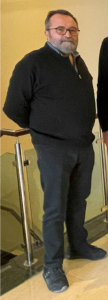 Dr. Marcelo de las Heras Guillamón, our third member isis full professor of Animal Pathology and Animal Health at the University of Zaragoza since about 2009. He has been working at this university for a long time, with a two-year break when he was a veterinary lecturer at the University of Glasgow. He also participated in processes, research projects and led collaborative research projects with others in Europe and around the world, especially in ovine pathology, specifically in respiratory pathology and retrovirus-associated tumours of the respiratory, nasal and pulmonary tract. He collaborated in other projects on various topics, especially in the pathology of laboratory animals, working with groups at the University of Zaragoza and with research groups from all over the world in this field. He currently devotes his time to teaching, focusing on work in the necropsy room as a post-mortem diagnostic tool. This is the second time he has participated as a member of the Syva Award Tribunal, although it has been a long time ago.
Dr. Marcelo de las Heras Guillamón, our third member isis full professor of Animal Pathology and Animal Health at the University of Zaragoza since about 2009. He has been working at this university for a long time, with a two-year break when he was a veterinary lecturer at the University of Glasgow. He also participated in processes, research projects and led collaborative research projects with others in Europe and around the world, especially in ovine pathology, specifically in respiratory pathology and retrovirus-associated tumours of the respiratory, nasal and pulmonary tract. He collaborated in other projects on various topics, especially in the pathology of laboratory animals, working with groups at the University of Zaragoza and with research groups from all over the world in this field. He currently devotes his time to teaching, focusing on work in the necropsy room as a post-mortem diagnostic tool. This is the second time he has participated as a member of the Syva Award Tribunal, although it has been a long time ago.
For him, the fundamental difference is the extension of the Syva Award to other countries: “I think it is a very good idea to extend the scope of the award to other participants who can apply, i.e. to extend it to other countries, as has been done this year….,“, he says. “Also to invite scientific colleagues from abroad, and that’s a great opportunity. I always like to have diversity, not only in the theses but also in the panel that has to evaluate them, I think the debates and the results are much better because of that. And this year a lot of the submissions came from abroad and there was very, very serious competition.”
Another appreciated point is the fact that two second prizes were awarded, which makes the work of the panel more serene, and with it the feeling of having really rewarded a work that deserves it.
 The presidentof this edition, Dr. Pedro Rubio Nistal, is full professor at the Faculty of Veterinary Medicine of the University of León in the Department of Animal Health. He has been teaching infectious diseases, preventive medicine, animal health and zoonosis for more than 20 years. His research department focuses on digestive diseases, the study of the digestive microbiota, alternatives to the use of antibiotics in animal production and the epidemiology of infectious diseases in wildlife.
The presidentof this edition, Dr. Pedro Rubio Nistal, is full professor at the Faculty of Veterinary Medicine of the University of León in the Department of Animal Health. He has been teaching infectious diseases, preventive medicine, animal health and zoonosis for more than 20 years. His research department focuses on digestive diseases, the study of the digestive microbiota, alternatives to the use of antibiotics in animal production and the epidemiology of infectious diseases in wildlife.
This is the third time he has chaired the Syva Award Panel. As you know, historically, the University of León has been the academic referent since the creation of the award. “There is nothing similar to this award here in Spain, and it is the most important prize awarded within the academic framework of the University of León in terms of prestige and the amount of the endowment provided by the Syva Laboratories”,, he emphasises.
He also highlights the improvements introduced in this edition, such as the thesis evaluation system, which in his opinion provides greater objectivity, and the participation of professors from universities outside Spain, which adds another dimension thanks to the diversity of experiences.
 The secretary of this scientific panel is Dr. Luisa de Arriba, responsible for regulatory affairs and immunological registration in Syva’s R&D department.. She has been involved in organisational matters and representing the company since 2009. This is the 15th time she has been part of the award panel. “What is common to all editions”, she says, “and this is our goal, is that the winning thesis is a good thesis, one that deserves an award. Another consistent aspect is that each time the members of the panel tell themselves that it will be difficult, that it is a great responsibility to award the prize, to choose the right thesis. But in the end we always succeed, and it is no coincidence that there is always a high degree of consensus on the theses that come first. So we all have the peace of mind, or the feeling of having done a good job.”.
The secretary of this scientific panel is Dr. Luisa de Arriba, responsible for regulatory affairs and immunological registration in Syva’s R&D department.. She has been involved in organisational matters and representing the company since 2009. This is the 15th time she has been part of the award panel. “What is common to all editions”, she says, “and this is our goal, is that the winning thesis is a good thesis, one that deserves an award. Another consistent aspect is that each time the members of the panel tell themselves that it will be difficult, that it is a great responsibility to award the prize, to choose the right thesis. But in the end we always succeed, and it is no coincidence that there is always a high degree of consensus on the theses that come first. So we all have the peace of mind, or the feeling of having done a good job.”.
Luisa de Arriba also wants to thank Syva for the fact that the tribunal is totally and absolutely independent. In other words, there are no instructions from the company as to the orientation of the award. ““‘Nevertheless, I stick to scientific criteria and my vote has the same weight as that of the rest of the jury, i.e. it counts for 20 % of the score, just like the rest of the jury. For me it is very important to have this independence. This level of objectivity and independence means that any thesis can be a winner and that no one should be presented with any bias“.
With this idea in mind, we encourage all young researchers from Europe and beyond to submit their theses for the next edition.
You may also be interested in
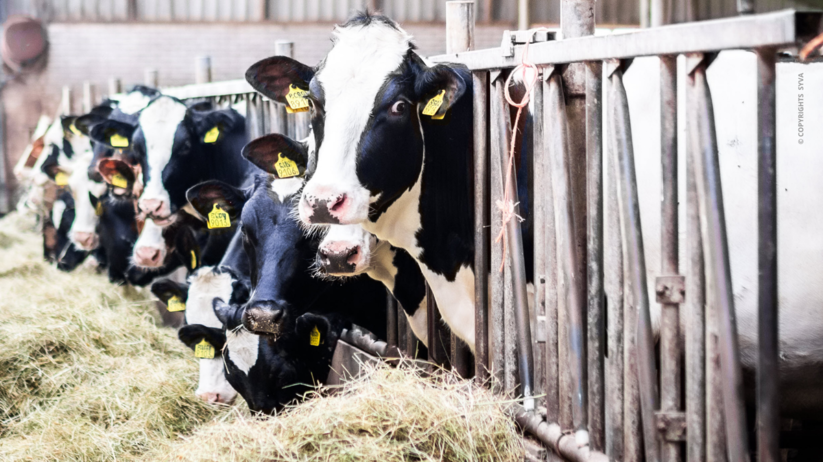
30 January, 2025
Syvac® EH Marker, the first and only DIVA vaccine against EHD, is now authorized in Belgium
Syva is pleased to announce that the FAMHP/FAGG has granted emergency use authorization for its marker (DIVA) vaccine against EHD in accordance with Article 110(2) of Regulation (EU) 2019/6 for use in cattle and deer.

24 January, 2025
Call for the 28th edition of the Syva Award International for the best doctoral thesis in Animal Health
We are pleased to remind you that the call for applications for the 28th Syva Award International is open until 18 February 2025. We also remind you that for two years now, the Syva Award International is no longer limited to Spanish candidates, but invites all doctoral students of any nationality who have submitted their thesis in animal health...
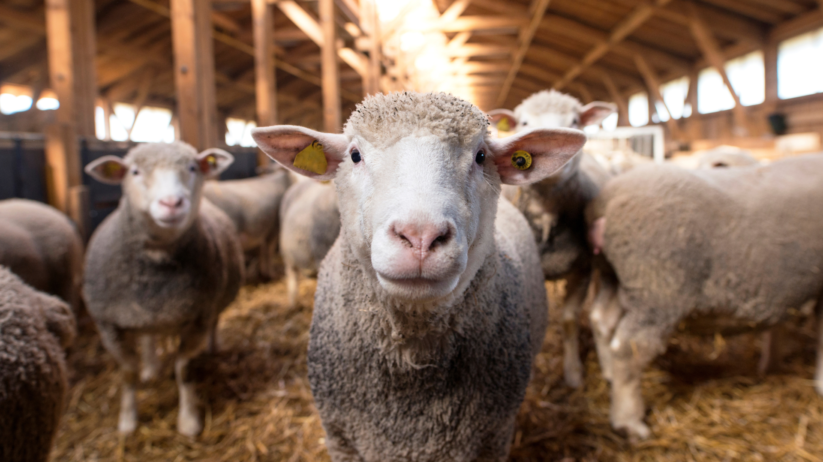
22 January, 2025
Syva receives a positive opinion for Syvazul BTV 3 vaccine from the CVMP of the European Medicines Agency (EMA).
On 15 January 2025, the Committee for Medicinal Products for Veterinary Use (CVMP) issued a positive opinion recommending the granting of a marketing authorization for Syvazul BTV 3 vaccine. This step forward marks an important milestone in the fight against Bluetongue, and Syva is proud to be at the forefront of this innovation.
